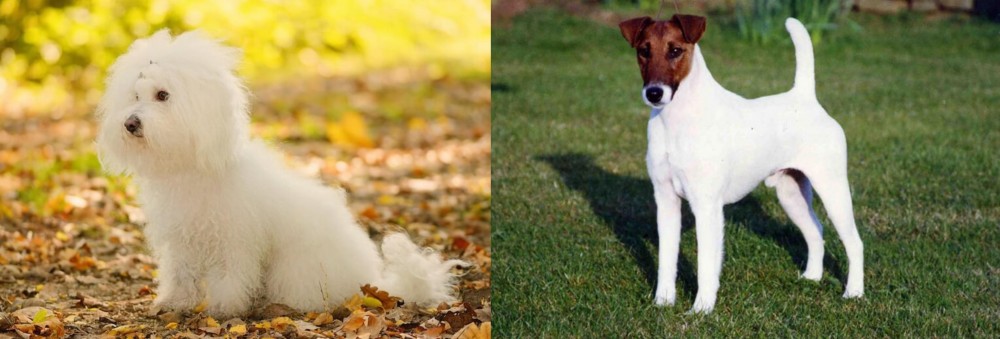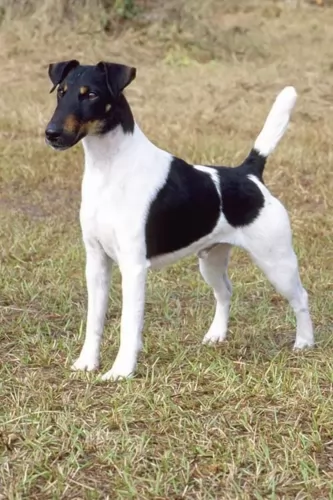 Petzlover
Petzlover Bichon Bolognese is originated from Spain but Fox Terrier (Smooth) is originated from United Kingdom. Bichon Bolognese may grow 37 cm / 14 inches shorter than Fox Terrier (Smooth). Bichon Bolognese may weigh 21 kg / 47 pounds more than Fox Terrier (Smooth). Both Bichon Bolognese and Fox Terrier (Smooth) has same life span. Bichon Bolognese may have less litter size than Fox Terrier (Smooth). Bichon Bolognese requires Low Maintenance. But Fox Terrier (Smooth) requires Moderate Maintenance
Bichon Bolognese is originated from Spain but Fox Terrier (Smooth) is originated from United Kingdom. Bichon Bolognese may grow 37 cm / 14 inches shorter than Fox Terrier (Smooth). Bichon Bolognese may weigh 21 kg / 47 pounds more than Fox Terrier (Smooth). Both Bichon Bolognese and Fox Terrier (Smooth) has same life span. Bichon Bolognese may have less litter size than Fox Terrier (Smooth). Bichon Bolognese requires Low Maintenance. But Fox Terrier (Smooth) requires Moderate Maintenance
 The Bichon Bolognese is one of 4 types of Bichon breeds the others being the Havense, the Bichon Frise and the Maltese. The Lowchen and the Coton de Tulear are also listed in this grouping at times. The Bolognese was developed in Italy and is a small, companion animal. They are named after the city of Bologna in Northern Italy. The Bichon Bolognese is considered a toy dog and are considered an ancient breed that lived with Italian nobility. Their precise ancestry is not known and the Maltese is considered its closest relative. They have been known to exist since at least 1200.
The Bichon Bolognese is one of 4 types of Bichon breeds the others being the Havense, the Bichon Frise and the Maltese. The Lowchen and the Coton de Tulear are also listed in this grouping at times. The Bolognese was developed in Italy and is a small, companion animal. They are named after the city of Bologna in Northern Italy. The Bichon Bolognese is considered a toy dog and are considered an ancient breed that lived with Italian nobility. Their precise ancestry is not known and the Maltese is considered its closest relative. They have been known to exist since at least 1200.
The Bichon Bolognese is found in many works of art throughout the centuries. They were the favorite of many an Italian artist since the 17th century including Titian, Watteau, Gosse and Goya. They were known to be owned by Duke Frederico Gonzaga, Madame De Pompadour, Catherine the Great of Russia and Empress Maria Theresa of Austria. Cosimo de Medici gave eight Bolognese to Belgian noblemen. The Duke d’Este was given two as a gift.
Of all the Bichon group – the Bolognese is the hardest to find and the best problem solver. They read body language amazingly well, stick with their owners and are attentive and devoted. Liz Stannard brought them to England in 1990 and they were entered in the breed registry that same year and joined the show ring cycle in 2001. By 2002 they were shown at Crufts, England’s International Dog Show.
 The Smooth Fox Terrier is one of two Fox Terrier breeds, the other being the Wirehaired Fox Terrier. Fox Terriers are believed to be one of the oldest terrier breeds and the ancestor of many terriers who came after. The Fox Terrier was recognized by the American Kennel Club in 1885 and the smooth Fox Terrier as a separate breed 100 years later in 1985. Some clubs still consider the two types of Fox Terriers as the same breed. The standard for smooth Fox Terrier was written in 1876 but not accepted until 1985.
The Smooth Fox Terrier is one of two Fox Terrier breeds, the other being the Wirehaired Fox Terrier. Fox Terriers are believed to be one of the oldest terrier breeds and the ancestor of many terriers who came after. The Fox Terrier was recognized by the American Kennel Club in 1885 and the smooth Fox Terrier as a separate breed 100 years later in 1985. Some clubs still consider the two types of Fox Terriers as the same breed. The standard for smooth Fox Terrier was written in 1876 but not accepted until 1985.
Both breeds of Fox Terriers are thought to originate in the late 1800’s descended from various British Terriers, the beagle, the dachshund and the Fox Hound. The Smooth Fox Terrier has a base coat that is white. The hunters bred them this way, so they would not mistake them for the fox during the hunt. They have also been very successful in prestigious dog shows including Crufts in England and New York Westminster in the United States.
They are not that popular today unless you are hunting and showing them in Confirmation Competitions. However, the Smooth Fox Terrier is significant because of all the terriers that consider it their direct ancestor. This would include the Jack Russel, the Rat Terrier and the Miniature Fox Terrier.
 Like the other members of the Bichon group, the Bolognese is a compact, little white dog. It is considered a member of the toy group and is stocky in its build. It is a muscled, square dog of medium length with an ovoid skull and large, square, black muzzle. The jaw is well developed, and they have black lips, black nose and black eyelids. They have a straight muzzle with a strong, aligned bite and its eyes are round and wide. They have long, high set ears that hang down to a rigid base. The coat is white, long and shorter only at the muzzle. The coat is fluffy but not fringed.
Like the other members of the Bichon group, the Bolognese is a compact, little white dog. It is considered a member of the toy group and is stocky in its build. It is a muscled, square dog of medium length with an ovoid skull and large, square, black muzzle. The jaw is well developed, and they have black lips, black nose and black eyelids. They have a straight muzzle with a strong, aligned bite and its eyes are round and wide. They have long, high set ears that hang down to a rigid base. The coat is white, long and shorter only at the muzzle. The coat is fluffy but not fringed.
 The Smooth Fox Terrier is distinguished from the Wirehaired and other terriers by his V-shaped head and white based coat. The coat can have tan, black and black and tan marks on the white coat. The Smooth Fox Terrier is sturdy, strong, sleek and symmetrical. The breed has a short back, and proportioned legs. The Smooth Fox Terrier has a flat skull and tapered muzzle. The nose is black, and the eyes are dark. He has v-shaped ears and a docked tail. Docking is no longer legal throughout the United Kingdom.
The Smooth Fox Terrier is distinguished from the Wirehaired and other terriers by his V-shaped head and white based coat. The coat can have tan, black and black and tan marks on the white coat. The Smooth Fox Terrier is sturdy, strong, sleek and symmetrical. The breed has a short back, and proportioned legs. The Smooth Fox Terrier has a flat skull and tapered muzzle. The nose is black, and the eyes are dark. He has v-shaped ears and a docked tail. Docking is no longer legal throughout the United Kingdom.
 These little white dogs with the shaggy hair are intelligent, loving, playful, loyal, and happy to do whatever you ask them to. They are more reserved than their relative the Bichon Frise. They are great at obedience training and seem to love it. They learn quickly and love to please you, yet they can also be very stubborn. Like the Bichon Frise, they are difficult to housebreak. They need to be with their people who they will develop bad habits and a bad attitude. They are bred to be companion dogs. If socialized when young they are great with strangers after you have indicated that the strangers are ok. They are barking watchdogs but not continuous barkers. They get along with other dogs but are ok by themselves as well. They do get separation anxiety when their people are gone for extended periods of time. They can be very serious and docile, but they love to be with people. They are very loyal and very bonded to their family.
These little white dogs with the shaggy hair are intelligent, loving, playful, loyal, and happy to do whatever you ask them to. They are more reserved than their relative the Bichon Frise. They are great at obedience training and seem to love it. They learn quickly and love to please you, yet they can also be very stubborn. Like the Bichon Frise, they are difficult to housebreak. They need to be with their people who they will develop bad habits and a bad attitude. They are bred to be companion dogs. If socialized when young they are great with strangers after you have indicated that the strangers are ok. They are barking watchdogs but not continuous barkers. They get along with other dogs but are ok by themselves as well. They do get separation anxiety when their people are gone for extended periods of time. They can be very serious and docile, but they love to be with people. They are very loyal and very bonded to their family.
Be sure you are the pack leader as they can acquire Small Dog Syndrome. With this syndrome the dog comes to believe he is the alpha and the humans are his pack. This causes many kinds of problems with behavior including howling when not getting attention, their separation anxiety and destructiveness can also come from this.
 Children friendliness They shouldn’t be trusted with young children but if raised with older children ok
Children friendliness They shouldn’t be trusted with young children but if raised with older children ok
They are good at performing tricks, Search and rescue, narcotics detection, tracking, and disability assistance.
Fox Terrier is adaptable and can live anywhere. He is not a big dog but remember he is very high energy.
They have very good learning ability and are very intelligent but can be stubborn
 One of the major problems for the Smooth Fox Terrier that the Wirehaired does not face is the potential for deafness. This is an issue in dogs that are mostly white in color. Other concerns that he does share with the Wirehaired Terrier are:
One of the major problems for the Smooth Fox Terrier that the Wirehaired does not face is the potential for deafness. This is an issue in dogs that are mostly white in color. Other concerns that he does share with the Wirehaired Terrier are:
Causes muscle weakness and problems swallowing.
 Like other toy breeds do not overfeed the Bolognese. Feed them ¼ of a cup of high quality dry food once a day. Treats are often used for training just be judicious with them.
Like other toy breeds do not overfeed the Bolognese. Feed them ¼ of a cup of high quality dry food once a day. Treats are often used for training just be judicious with them.
They are very healthy with a propensity toward: Moving kneecaps (Luxating patella)
Legg-Calve-Perthes Disease – This causes the thigh bones to shrink due to a loss of blood supply. It can be repaired surgically.
Periodontal Disease due to their small mouth size.
They need to walk everyday but they can be couch potatoes. One long 20-minute walk will do or a couple 10-minute walks.
While Bolognese are perfectly happy to lounge around the house, they should also have a daily walk.[7] A suitable walk would be around 20–25 minute a couple of times a day or substitute 10-minute walks a few times a day. They love to play off-lead, whether its in the house or in a fenced in yard or dog park.
 Feed 2-3 meals per day and divide 1/8-1/4 cup
Feed 2-3 meals per day and divide 1/8-1/4 cup
Feed two meals per day and divide ½ cup
hearing and vision
The Smooth Fox Terrier is an athlete requiring a lot of exercise. Take him on long walks and play with him in a large fenced yard. Don’t coup him up in the house. Be careful not to exercise him off leash as he will chase anything that moves and will not come when called. They need mental stimulation as well as physical. They are good at hunting, agility, tracking, performing tricks and being a watchdog.